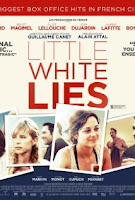Most cinema-goers in France see the same Hollywood product as the rest of the world, but the French government (nationally and regionally) goes out of its way to support a francophone film industry. For example, support to domestic films is a condition of the Canal+ TV licence. Admittedly much of what is produced is quite lightweight but at least it’s French, and it doesn’t get beyond the francophone world, where mainstream audiences don’t much go for subtitled foreign language films anyway. However, the best French films have for a long time attracted enthusiasts, cinéastes even, and are subject to serious critical attention eg recently, The Faber Book of French Cinema.
From time to time, French films do make it into the international mainstream. Recently, for example La Vie en Rose (an Edith Piaf biopic, La môme, in France) which became the third-highest-grossing French-language film in the United States in the last two decades. Piaf was played by Marion Cotillard, the partner of Guillaume Canet. Canet directed Tell No One (Ne le dis à personne, 2006), a well-regarded thriller, which he followed with Little White Lies (Les petits mouchoirs), just released in the UK.
 Cotillard and others make up a strong cast for this tragi-comic story of Parisians on holiday at Cap Ferret, one of those French pine and sand seaside places with baffling 10-months-idle-out-of-12 economics. The plot (and some of the music) has more than a passing resemblance to Lawrence Kasdan’s The Big Chill (1973). Little White Lies is a bit too long and the cast a bit too slick at piling on the sentiment, however familiarity with some of the locations made up for a lot. If any reader who doesn’t know the area is looking for somewhere new to go in France this summer, Archachon, its Bassin, and the Pyla Dune certainly ‘merite un detour’, as does Cap Ferret and the view from the lighthouse there. In the magic two months of July and August, expect it to be busy.
Cotillard and others make up a strong cast for this tragi-comic story of Parisians on holiday at Cap Ferret, one of those French pine and sand seaside places with baffling 10-months-idle-out-of-12 economics. The plot (and some of the music) has more than a passing resemblance to Lawrence Kasdan’s The Big Chill (1973). Little White Lies is a bit too long and the cast a bit too slick at piling on the sentiment, however familiarity with some of the locations made up for a lot. If any reader who doesn’t know the area is looking for somewhere new to go in France this summer, Archachon, its Bassin, and the Pyla Dune certainly ‘merite un detour’, as does Cap Ferret and the view from the lighthouse there. In the magic two months of July and August, expect it to be busy.Peter Aspden recently gave his Culture column in the FT over to a very droll tongue-in-cheek discussion of boboisme, in the context of Little White Lies:
You all know how it is with a certain type of French film. The women are beautiful, and so are the men. They smoke, but they do not have rasping coughs. They gather for al fresco suppers at their beach houses, and open bottles of cru classé wines that are drinking perfectly right now. They are good friends, with wholesome appetites and slim silhouettes.Little White Lies is certainly bobo but less intello than this description implies - no philo, for sure.
… they talk of life. They wave their arms charismatically and make references to the philosophers they studied in their perfect schools. Their conversation is witty and fluent, and touches intellectual and emotional depths. Before the end of the evening, two of them will have paired off, seduced by the erotically charged debate. There are more cigarettes, more wine, more philosophy. None of them needs an early night because they don’t appear to have jobs, though they seem strangely well off. By the end of the film, they have wrestled with the dilemmas of human existence, but their affluent lives go on. There is always next Saturday night.
The French are not without a sense of self-deprecation, so they have a word for these admirable creatures: they are the bobo set, the “bourgeois bohemians” who fill the air with exotic ramblings and yet enjoy all the material comforts of a gilded life. It is a pejorative, ironic term. Yet the bobos are the envy of the world. They have worked out how to be rich and interesting, replete and reckless.
The French film which has impressed me recently was Mia Hansen-Løve’s Father of My Children (Le père de mes enfants, 2009), a very accomplished start to an almost certainly brilliant directing career. Here she is talking about that film.

No comments:
Post a Comment